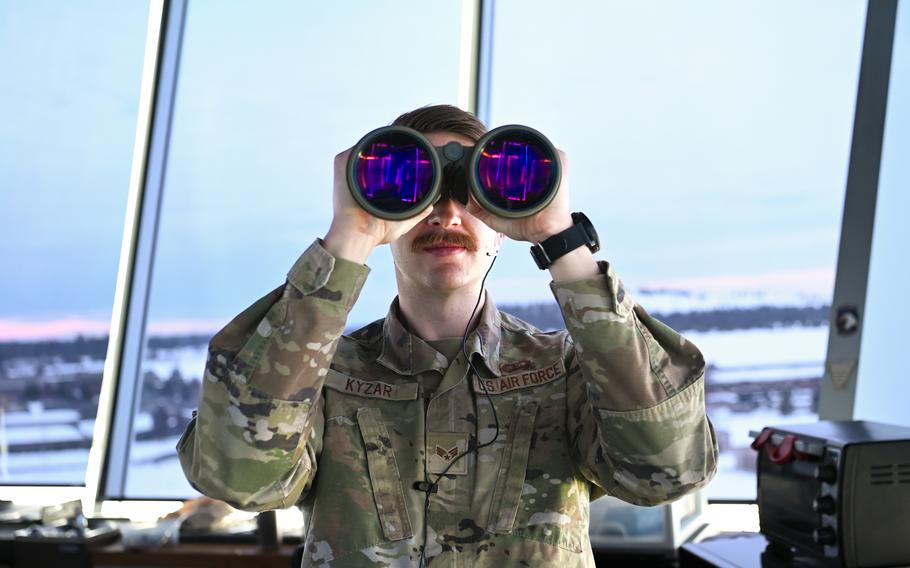
Senior Airman Brent Kyzar, 92nd Operations Support Squadron air traffic control apprentice, uses his binoculars to locate aircraft on the flightline at Fairchild Air Force Base, Wash., Jan. 5, 2023. ATC Airmen are responsible for clearing pilots during takeoff and landing and also play a significant role in communicating vital flight patterns and weather information. (Stassney Davis/U.S. Air Force)
An increasing reliance on overtime to staff air traffic control facilities and outdated technology is putting aviation safety at risk, a panel of experts assembled by the Federal Aviation Administration said Wednesday in a report.
The group, which includes former FAA administrator Michael Huerta and former National Transportation Safety Board Chairman Robert L. Sumwalt, said the agency quickly needs to take steps to boost hiring and overhaul its aging systems.
“Air traffic controllers who must climb stairs to the top of a 200-foot air traffic control tower because of an elevator outage may find functioning equipment when they finally arrive, but they are not in the best physical or mental condition to perform their duties,” the group wrote. “These challenges inject risk into the system.”
The panel was assembled as part of the FAA’s response to near misses involving airliners early this year that alarmed the aviation industry. Many of the report’s conclusions echo testimony in recent congressional hearings and findings from the Transportation Department’s inspector general.
Michael Whitaker, the FAA’s new administrator, said he welcomed the panel’s work and would review the findings.
“We appreciate the team’s time and expertise to help us pursue our goal of zero serious close calls,” he said in a statement.
The FAA logged 23 of the most serious kind of close calls in the past year and the NTSB is investigating more than a half-dozen incidents, including a collision between two private jets at a Houston airport last month. Jennifer Homendy, the board’s chair, said after a Senate committee hearing that the aviation industry needs to take urgent action.
“All the red flags are there,” Homendy told reporters. “We are sounding the alarm bells and we need action.”
The FAA is trying to boost air traffic controller hiring, but Wednesday’s report makes clear its current plans are unlikely to lead to a significant increase in air traffic controllers anytime soon, calling the agency’s academy a “bottleneck.”
“The hiring plan produces a negligible improvement over today’s understaffed levels,” the report says.
The panel also said the agency is too reliant on outdated technology and has failed to achieve efficiency gains from a major technological overhaul known as NextGen.
“There is a limit to how far the challenges of inadequate, obsolete, and unreliable facilities, equipment, and technology can be managed to preserve safety by sacrificing efficiency,” the panel wrote.